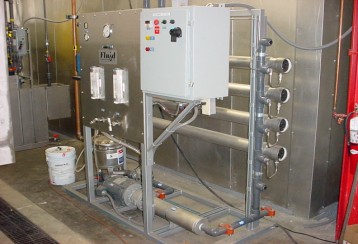|
Reverse Osmosis - How
R/O Water Make Up
Reverse osmosis, also known as hyperfiltration,
is the finest filtration known. This process will allow
the removal of particles as small as ions from a solution.
Reverse osmosis is used to purify water and remove salts
and other impurities in order to improve the color,
taste or properties of the fluid. It can be used to
purify fluids such as ethanol and glycol, which will
pass through the reverse osmosis membrane, while rejecting
other ions and contaminants from passing. The most common
use for reverse osmosis is in purifying water. It is
used to produce water that meets the most demanding
specifications that are currently in place. Reverse
osmosis uses a membrane that is semi-permeable, allowing
the fluid that is being purified to pass through it,
while rejecting the contaminants that remain. Most reverse
osmosis technology uses a process known as crossflow
to allow the membrane to continually clean itself. As
some of the fluid passes through the membrane the rest
continues downstream, sweeping the rejected species
away from the membrane. The process of reverse osmosis
requires a driving force to push the fluid through the
membrane, and the most common force is pressure from
a pump. The higher the pressure, the larger the driving
force. As the concentration of the fluid being rejected
increases, the driving force required to continue concentrating
the fluid increases. Reverse osmosis is capable of rejecting
bacteria, salts, sugars, proteins, particles, dyes,
and other constituents that have a molecular weight
of greater than 150-250 daltons. The separation of ions
with reverse osmosis is aided by charged particles.
This means that dissolved ions that carry a charge,
such as salts, are more likely to be rejected by the
membrane than those that are not charged, such as organics.
The larger the charge and the larger the particle, the
more likely it will be rejected.
By GE

Painter Design Builds R/O Sytems
We can supply a R/O make up unit for your needs
using GE hyperfiltration Membranes. 1 gal per hour up
to 5000 gallons per hour. Call today for more information

Fiberglass Storage Tanks
Lets us supply your r/o storage tanks with fiberglass
tanks. Sizes from 50 gal. up to 25,000 gallon units.


Contact us for
more info
|
|
|
